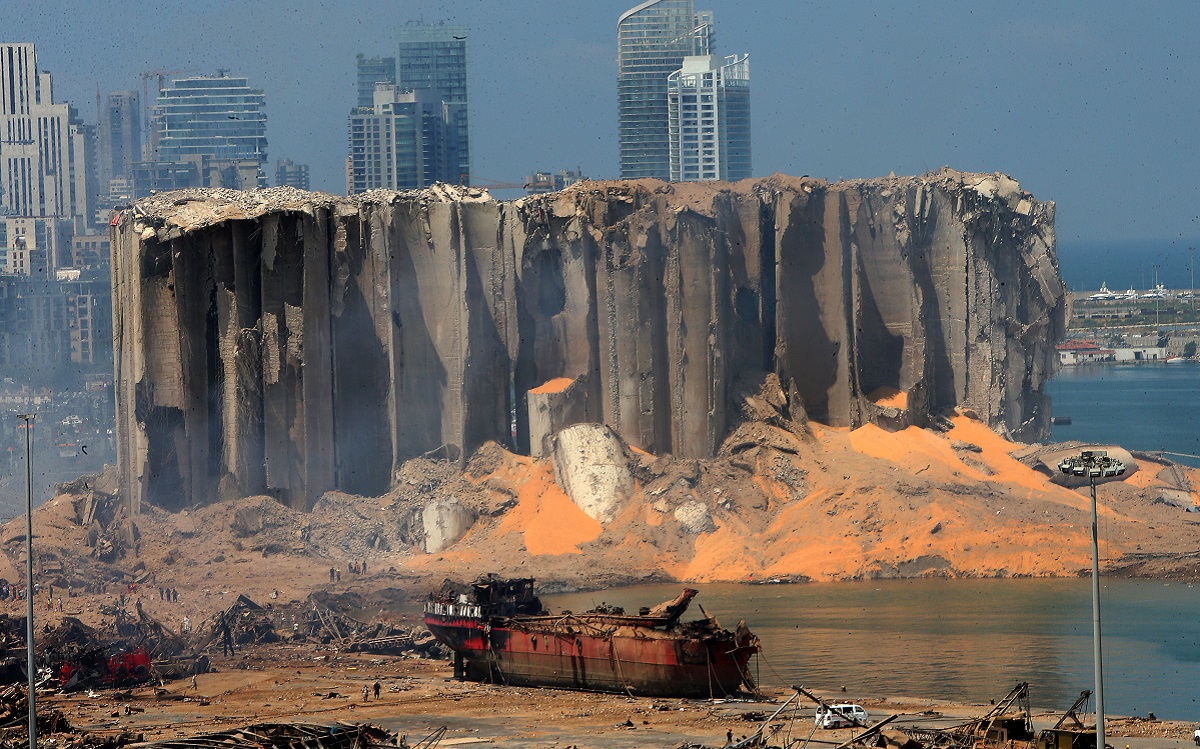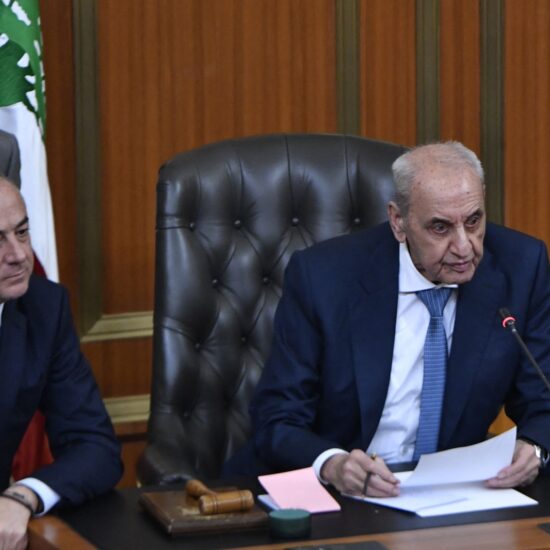
“#People_will_judge” was not a slogan that the authorities would be comfortable with.
Among the institutions the Lebanese blamed for the explosion was also the judiciary. They knew, but chose to send papers further and, when nothing was done, they sat back thinking they had done their job.
Amidst anger over the judiciary, and a revolution that has been fighting for judicial independence, it was hard to convince the Lebanese that a professional and impartial judge would be assigned by a corrupt government to bring justice in the Beirut blast case and hold accountable the same system that appointed them.
However, we ended up believing that a magistrate was a hero of justice just because we had not seen anyone summon high-ranking politicians to questioning before. Nonetheless, any moves towards justice were obstructed, and the investigation, a year and eight months later, is completely blocked and has born no results whatsoever.
Moreover, it is completely frowned upon in society to question the hero’s performance. However, how did we build this image of the hero-magistrate? Was it based on solid background and results in the Beirut blast investigation? Or was it based on few pieces of information carefully fed to the media at moments of great despair when we had noone else to give us hope?
Here is a puzzle put together that will show how we created a hero out of nothing.
In the wake of the August 4, 2020 explosion, a narrative spread widely in the media: that an abandoned shipment of ammonium nitrate had caused the massive blast.
The public’s focus was turned to the Rhosus, the ship allegedly carrying the ammonium nitrate, which entered Lebanon on November 21, 2013. Noone even spoke about other possible dangerous materials stored in the port at the same time, noone looked into how and who decided to store the ammonium nitrate in Hangar 12. The government said it was the safest hanger in the port, but it didn’t meet any of the conditions required for such hazardous cargo.
Was that the only dangerous substance stored in the Beirut port? Unfortunately, no one, to date, is looking beyond the Rhosus abandoned cargo narrative disseminated by the Lebanese government. According to Knoema, a data platform for business users, ammonium nitrate has been transiting through Lebanon since 2004. Moreover, most of the pictures taken after the blast show two hangars burning at the same time: 12 and 10. That aspect was not covered either.
The government’s response to Beirut explosion
The first judicial action taken right after August 4 was on August 10, when the Lebanese government referred the Beirut explosion file to the Judicial Council, a special court without appeal procedures. No indictments were issued, but 37 people were investigated, while 19 were detained during questioning, reportedly in harsh circumstances. The government also resigned on that same day. Judge Fadi Sawan was assigned as a lead for the investigation on August 13.
Meanwhile, on the side of civil society, a group of Lebanese women activists vehemently supported the judge in his mission, which caused controversy among the October 17 activists. Many opposed such a show of support, as they did not see it fit to support a judge that was part of a corrupt justice system working mostly in favor of political interests. Ultimately, we agreed to show support until we noticed suspicious actions or lack of results, after which we were meant to escalate progressively.
In the six months that followed, we demonstrated in support of the judge in front of his two residences. We saw it as a chance, even a slim one, to get things done for once. It was clear to many Lebanese that a weak judiciary that hadn’t been able to make politicians move the hazardous cargo from the port in years of court procedures would be unlikely to see this investigation through. But still, we supported it.
On December 10, 2020, judge Sawan summoned Prime Minister Hassan Diab and three former ministers and currency MPs on charges of “negligence leading to death”. This was indeed a courageous step. Noone had done this before. But Sawan didn’t receive much support, not even enough media coverage. Many criticized him for only indicting four politicians.
And the criticism was warranted: former Prime Ministers Tammam Salam and Najib Mikati and ministers who served in their governments in 2013-2014 should have also been questioned regarding the Rhosus shipment affair. Mikati was caretaker PM in November 2013 when the shipment entered Lebanon. Tammam Salam’s government was sworn in in February 2014, and ammonium nitrate cargo was stored in the port in October 2014.
Sawan’s daring move was faced with lawsuits by indicted ex-ministers Ghazi Zeaiter and Ali Hassan Khalil, who are close to Parliament Speaker Nabih Berri. They accused Sawan of violating Article 40 of the Constitution by investigating two former dignitaries and current MPs without requesting the Parliament and professional orders to lift their immunities and submitted a memorandum before the Discriminatory Public Prosecution requesting that the case be transferred to another judge.
Sawan also had not requested the Order of Lawyers to allow the investigation of the two MPs, according to the Law Regulating the Legal Profession.
The Supreme Court admitted the accusations and fired Sawan. He was fired and replaced with Tarek Bitar in February 2021. His mandate was over and, with the exception of a few articles that looked at the ridiculous accusations against him – including the fact that he had a house that was damaged by the explosion, hence he couldn’t be objective – the public’s attention moved to the new appointee.
Bitar chose to limit the investigation’s scope to the officials who were notified of the presence of the cargo in the port, were aware of the danger, and did not act to protect the population. This decision, of course, is not enough, as it is equally urgent to hold accountable the officials and employees who remained silent when their duty was to report the danger of keeping the ammonium nitrate in the port hangar.
Bitar chose to limit the investigation’s scope to the officials who were notified of the presence of the cargo in the port, were aware of the danger, and did not act to protect the population. This decision, of course, is not enough.
Bitar didn’t officially accuse nor summon anyone in the first four months. And when he did, he kept calling for questioning the same people who had been already questioned by Sawan. However, for the Lebanese public, Bitar was more visible. More information about the investigation was leaked to the media, and all his moves were announced, be it unofficially, in the press.
He was portrayed as a fighter, more flexible than other investigative judges, more courageous. He was also one of the few Lebanese magistrates whose activity was portrayed positively in the media.
On July 2, an alternative media Instagram page, @Megaphonenews, the same platform that was rhetorically asking “only these four?” when Sawan had summoned the officials, broke the news: Bitar was summoning the same politicians – ex-minister Zeaiter, Khalil, Marada member Youssef Fenianos, and former PM Hassan Diab.
The response from the politicians was not unexpected: they complained that they found out about the summons from the media.
The media in general, especially outlets that had been active during the October 17 uprising, portrayed Bitar as the hero. Since the news about Sawan’s previous achievements wasn’t properly covered – be it for lack of transparency or any other reason – the public was fascinated by Bitar’s continuation of Sawan’s job.
Bitar had done nothing new so far, but popular opinion had already flipped from opposing the judicial establishment and questioning its capacity to serve justice, to trusting a judge as a savior. The same alternative media – both websites and social media based news platforms that gained popularity during the October 17 uprising – that were campaigning positively for Bitar had earlier blamed Sawan for doing the same things. Bitar was celebrated, while Sawan had not done enough. Bitar was actually referred to as “Iron hand.” Intentional or not, it was clear there were double standards.
We, a group of activists, had decided to support the investigation until we detected a faux pas. We should have increased the pressure on the judiciary for more output. Instead, we repeated the same strategy (whether it was planned or not) – supporting the judge – on a longer time scale.
We pushed for the Order of Lawyers to lift Khalil, Zeaiter and Fenianons’ immunity, and, although it took quite some effort, they eventually did.
On September 20 the Mikati government was sworn in, and with it, the immunities were lifted automatically until October 19, 2021 when the parliamentary session was to be held again. It was a window of opportunity.
But, right at that time, articles were published claiming that Bitar would not hesitate to accuse Hezbollah’s leader Hassan Nasrallah and Amal Movement leader Nabih Berri. Bitar never confirmed nor denied, and that was probably his biggest mistake. Hezbollah retaliated.
On September 24, LBCI reporter Lara el Hachem broadcast a message from high-ranking Hezbollah official Wafic Safa threatening Bitar and accusing him of leading a politicized investigation, seeking to involve Hezbollah at the orders of the US Embassy.
Smoke and mirrors
Threats are not uncommon in Lebanon. Sawan also found a slaughtered cat in front of his house before he was fired.
But this threat against Bitar was political, and it implied more than just personal safety. Safa’s message implied that Hezbollah was able to decide what happens in the country and also influence the law. Although Bitar was entitled to file a lawsuit against Safa, for what the Hezbollah official said was technically slander, he didn’t. The threat remained a controversy in the media only and it contributed to the escalation of events in Beirut.
On October 9, a message circulating on Whatsapp groups – “Bitar won’t hesitate to name Nasrallah and Berri” – stirred some spirits. Some were happy, others were angry and some were worried.
For whoever has lived in Lebanon for a long time, this was an obvious sign that things were to go far beyond a few lawsuits to block the investigation. What ensued was, again, smoke and mirrors, just like those mentioned in the first part of this series of articles.
On October 12, 2021 Bitar issued an arrest warrant against Ali Hassan Khalil. He had done the same earlier with Finianos and Diab, both of whom fled the country earlier, on September 15.
On October 13, Ali Hassan Khalil was scheduled for questioning but never showed up.
On October 14, after Hezbollah and Amal bussed supporters to protest against Bitar in front of the Palace of Justice in Beirut, hell broke loose. Hezbollah and Amal supporters clashed with residents of the Christian neighborhood of Ain el Rammaneh, who also happened to be Lebanese Forces supporters. Several people died and many were wounded in a gun fight that lasted a few hours. Hezbollah and Amal supporters used RPGs, while residents of the buildings used sniper rifles from rooftops. The incident created a new “us versus them” sectarian situation. Several residents involved in the fighting were arrested and LF leader Samir Geagea was even charged with ordering the attack on the Hezbollah supporters. The controversy stole the attention of the public from the Beirut blast probe, which remains frozen to this day.
Back to the probe
This is not by any means an ode to Fadi Sawan, for he made mistakes too. Jorge Moreira, who owned the ammonium nitrate, was arrested in Chile last week after he had fled from his native Portugal. His extradition hearing in Portugal was dismissed in 2020, after Lebanon missed the deadline to submit the proof so that Moreira would remain under arrest.
Interpol red-flagged Moreira on January 12, 2021. But in order to arrest him again, Sawan had to submit evidence to the Portuguese authorities. He missed the deadline, as he was suspended due to Zeaiter and Khalil’s complaints at the Supreme Court.
Bitar should have handled that task as he was handed over all Sawan’s pending tasks. Neither of them sent the evidence, yet both were specifically investigating this shipment, owned by Moreira. We wouldn’t have found out about it if the Chilean authorities hadn’t arrested Moreira last week.
Today, a year and eight months after hundreds of people died in the biggest non-nuclear explosion in the world, we still have nothing but a Human Rights Watch report where advocates managed to uncover more than any magistrate.
The entire port explosion investigation has been reduced to Ali Hassan Khalil, Ghazi Zeaiter and their refusal to comply with Bitar’s summons. It was also reduced to Hezbollah and Amal blocking the government for three months over Bitar’s dismissal.
Yet, no one is talking about other lines of investigation or the related murders that have happened in the past year and eight months. No one is calling shipping companies that dealt with fertilizers for questioning.
Noone seriously investigated Joe Bejjani’s death – the army photographer who had taken pictures of Hangar 12 and who was assassinated two months after the explosion. No one investigated the mysterious death of Colonel Joseph Skaff in 2017. Colonel Skaff’s case reemerged after Beirut port explosion because he had written a letter in February 2014 to the “Smuggling and Auditing Department” of the Ministry of Finance, in which he demanded that the Rhosus ship carrying 2,750 tons of ammonium nitrate be removed from Berth 11 in the port of Beirut and placed under proper control.
And one more question: have we taken all the needed documents for the investigation from Savaro, the company that owned the ammonium nitrate, before it gets dissolved? And why was freezing the dissolution an initiative that four lawyers took on last February, and rather than initiated by the Lebanese judiciary?
We are not dealing with politicians with parliamentary immunity. We’re missing international deadlines related to Beirut’s explosion and we’re stuck in a scenario where high-ranking politicians are covering for their cronies. All the alternative ways to crack the case have been left out.
We are not on the right track to achieve justice.
Today, a year and eight months after hundreds of people died in the biggest non-nuclear explosion in the world, we still have nothing but a Human Rights Watch report where advocates managed to uncover more than any magistrate.
Mariam Kesserwan is a Lebanese civic activist who was part of the 2015 You Stink movement. During the October 17, 2019 protests she founded the @LebanonUprising page on Instagram, a well-known outlet that exposes corruption and violations.
The opinions expressed are those of the author only and do not necessarily reflect the views of NOW.
The article was amended on April 30, 2022, to correct an editing mistake and remove a paragraph that included wrong information referring to a precedent from 2000, when two ex-ministers were tried by a regular court. The piece said there were two Supreme Court rulings allowing exceptions from Article 40 of the constitution. The correct information is that they allowed exceptions from Article 70, which requires ex-dignitaries to be tried by a special court.








